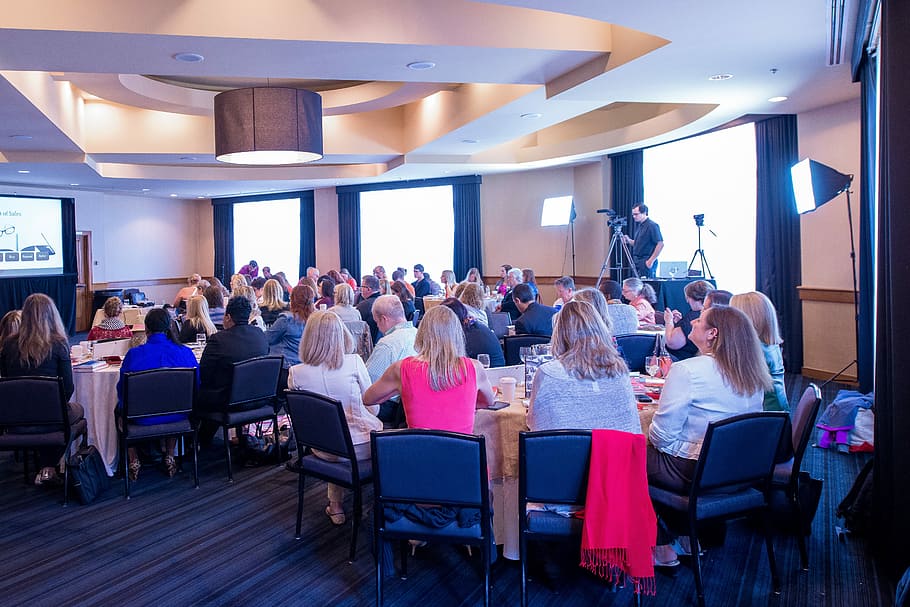7 Event Marketing Strategies to Elevate Your Events

Event marketing is crucial for attracting attendees, sponsors, and partners to your event. Whether you’re organizing a conference, trade show, product launch, or corporate gathering, effective marketing strategies can make the difference between a packed venue and a sparsely attended one. In this blog, we’ll explore seven actionable event marketing strategies that can help you boost your event’s visibility, engagement, and overall success.
1. Leverage Social Media for Maximum Impact
Social media is one of the most powerful tools available for event marketing. With platforms like Facebook, Instagram, LinkedIn, and Twitter, you can reach your target audience quickly and effectively. The key is to use each platform’s strengths to your advantage.
- Create Event Pages: Start by creating dedicated event pages on Facebook and LinkedIn. These platforms allow you to post updates, share news, and interact with your audience in real time. Use these pages to share important details about your event, including the agenda, speakers, venue, and registration process.
- Engage With Interactive Content: Social media thrives on engagement, and interactive content such as polls, Q&A sessions, and countdown timers can draw more attention to your event. For example, Instagram Stories’ poll feature lets you ask potential attendees questions about what they’re looking forward to or their preferences for event sessions.
- Use Hashtags Effectively: Create a unique hashtag for your event and use it across all posts related to the event. Encourage attendees and speakers to use the hashtag when they share posts, photos, or updates about the event. This can help increase visibility and create a sense of community around your event.
- Paid Advertising Campaigns: Organic reach on social media can be limited, especially for business accounts. Consider running paid advertising campaigns targeting specific demographics relevant to your event. Facebook Ads, LinkedIn Ads, and Instagram Ads are great options for reaching a broader or more specific audience.
2. Craft Compelling Email Campaigns
Email marketing remains one of the most effective ways to reach potential attendees directly. A well-structured email campaign can generate interest, increase registrations, and build excitement leading up to the event. Here’s how to maximize the impact of your emails:
- Segment Your Audience: One-size-fits-all email campaigns rarely work. Divide your email list into segments based on factors like previous attendance, location, or industry. Tailor the messaging for each group to address their specific needs and interests. For example, VIP attendees might receive exclusive early-bird access, while first-time attendees could be enticed with a discount code.
- Personalize the Content: Personalized emails tend to have higher open rates. Include the recipient’s name and reference past interactions with your event, such as if they attended before or expressed interest in particular sessions.
- Create a Sense of Urgency: Use limited-time offers, such as early bird discounts or exclusive perks, to encourage quick registration. Countdown timers embedded in your emails can add a visual sense of urgency.
- Schedule a Series of Emails: Don’t rely on a single email to do all the work. Build a campaign that spans the period leading up to your event. For instance, send out a save-the-date email, followed by registration details, speaker announcements, and final reminders.
3. Build Partnerships With Influencers and Industry Experts
Influencer marketing isn’t just for consumer brands. Partnering with influencers and industry leaders in your niche can help promote your event to their engaged audiences. These partnerships provide a level of trust and authority that’s hard to replicate through other marketing channels.
- Identify Key Influencers in Your Industry: Start by finding influencers who have a strong presence in your event’s field. This could include bloggers, podcasters, or social media personalities who regularly engage with your target audience.
- Offer Incentives for Collaboration: Influencers are often open to promoting events in exchange for compensation, free access to the event, or exposure. Offer them speaking opportunities, VIP treatment, or other incentives that make the collaboration beneficial for both parties.
- Leverage Their Audience: Ask your influencers to promote your event through their channels. They can share posts, create blog content, or host live sessions where they talk about the event. The key is to make the partnership feel authentic and natural rather than forced promotion.
4. Create a User-Friendly Event Website
Your event website is the central hub where attendees will find everything they need to know about your event. It should be easy to navigate, provide clear information, and drive registrations. Here’s what you need to consider when designing your event website:
- Highlight Key Information: The homepage should include the essential details – the event’s date, time, location (whether physical or virtual), and a brief description of what attendees can expect. Make the registration button easy to find and clearly visible.
- Optimize for Mobile Users: A significant portion of your audience will access your site via mobile devices. Make sure your website is responsive, loads quickly, and offers a seamless experience on mobile.
- Incorporate Multimedia Content: Use videos, images, and infographics to make your website more engaging. Highlight speaker profiles, showcase past event success, or create a promotional video that builds excitement for the event.
- Include Testimonials and Social Proof: Social proof is powerful. Include testimonials from past attendees, highlight prominent sponsors, or feature logos of companies who’ve previously supported your event.
- Ensure Seamless Registration: A smooth registration process is crucial. Keep the form short, offer multiple payment methods, and confirm registrations with a clear follow-up email.
5. Leverage Event Apps for Engagement
Event apps have become essential for engaging attendees before, during, and after an event. These apps offer an interactive way to provide schedules, speaker details, and networking opportunities. Here’s how to make the most of them:
- Offer Networking Tools: Many event apps come with features that allow attendees to network with each other. These might include chat functions, attendee profiles, or matchmaking algorithms that connect people based on their interests or industry.
- Push Notifications: Use push notifications to remind attendees about upcoming sessions, share important updates, or provide exclusive content. Be mindful not to overuse this feature, as too many notifications can become overwhelming.
- Gamification: Incorporating gamification elements, such as scavenger hunts or point-based challenges, can make the event more engaging. Encourage attendees to explore different booths or attend sessions by rewarding them with points or prizes.
- Live Polling and Q&A: Interactive features like live polling or Q&A sessions allow attendees to engage directly with speakers or the content being presented. This helps create a more immersive and participatory experience.
6. Utilize Content Marketing to Generate Buzz
Content marketing is an excellent long-term strategy to build excitement around your event. By producing valuable content, you can showcase the benefits of attending while positioning your event as a must-attend gathering in your industry.
- Start a Blog Series: Begin by creating a series of blog posts that highlight different aspects of your event. This might include previews of sessions, interviews with speakers, or behind-the-scenes looks at the planning process. Optimize each blog post for search engines to capture organic traffic.
- Create Downloadable Guides: Provide attendees with downloadable content, such as event guides, speaker lineups, or tips for making the most of the event. This not only adds value but can also serve as a lead magnet for potential attendees who may still be on the fence.
- Host Webinars or Live Pre-Event Content: Hosting a pre-event webinar can help generate excitement while giving attendees a taste of what to expect. You can also host live Q&A sessions on social media or your event website, giving attendees the chance to engage directly with speakers or event organizers.
- Use Video Content to Promote the Event: Video is one of the most engaging forms of content online. Create teaser videos that highlight the best parts of your event, from the keynote speakers to the exciting activities planned. Share these videos across your social media platforms and email campaigns.
7. Leverage Event Analytics to Optimize Your Strategy
Data is one of the most valuable tools at your disposal when it comes to event marketing. By tracking and analyzing key metrics, you can refine your strategies to improve outcomes.
- Monitor Registration Trends: Keep a close eye on how registrations are progressing. If you notice a slowdown, it may be time to ramp up marketing efforts or offer additional incentives like discounts or giveaways.
- Track Social Media Engagement: Use tools like Hootsuite or Sprout Social to monitor social media activity related to your event. Identify which platforms and types of content are generating the most engagement, and adjust your strategy accordingly.
- Analyze Email Campaign Performance: Look at open rates, click-through rates, and conversion rates for your email campaigns. This data can help you identify which messaging resonates best with your audience.
- Post-Event Surveys: After the event, send out surveys to gather feedback from attendees. This can provide valuable insights into what worked well and what areas could be improved for future events.
Conclusion
By implementing these seven event marketing strategies, you’ll be better equipped to promote your event effectively and ensure a high level of engagement and participation. The key is to take a multi-channel approach, leveraging the power of social media, email, content marketing, and data-driven insights to build momentum and drive results.








